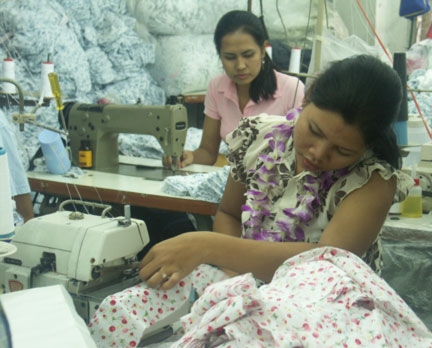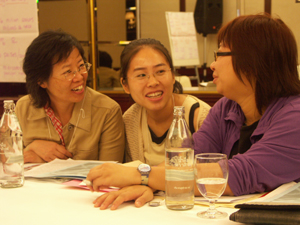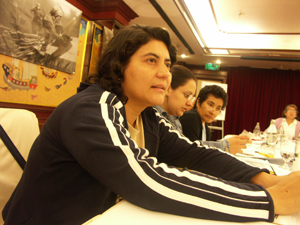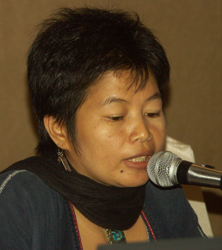WELCOME TO THE ARCHIVE (1994-2014) OF THE MAQUILA SOLIDARITY NETWORK. For current information on our ongoing work on the living wage, women's labour rights, freedom of association, corporate accountability and Bangladesh fire and safety, please visit our new website, launched in October, 2015: www.maquilasolidarity.org
October 1, 2005

Eighteen women labour rights activists from seven countries in Asia and Latin America gathered in Bangkok, Thailand October 23 to 30 for the Asia - Latina Women's Exchange organized jointly by the Asia Monitor Resource Centre (AMRC) and MSN, with the Thai Labour Campaign (TLC) as our local sponsor.
Coming ten months after the demise of the Multi-Fibre Arrangement (MFA), the exchange was designed to give participants an opportunity to share what the end of the import quota system has meant for workers and communities in Thailand, China/Hong Kong, Cambodia, Honduras, Guatemala, Mexico and the Dominican Republic and to discuss strategies for better defending workers' rights in a post-quota industry.
Participants spent the first day together mapping the impacts of the quota phase out. While all agreed that the realities being faced on the ground don't necessarily mirror what various industry and trade experts had foretold, there was consensus that workers' rights are at risk.
Discussions then shifted to assessing the effectiveness and limitations of some of the strategies being pursued, including worker organizing, engaging with brands, developing national policy proposals, etc.
Representatives from four groups working in China participated in the exchange. According to May Wong of AMRC, while statistics may show that China is a "winner" in the post-MFA race, gains in terms of market share and investment come at a cost to Chinese workers in the form of exploitative jobs.
She described China as the world's "sweatshop powerhouse," with abysmal working conditions, strict controls prohibiting worker organizing, lack of enforcement of labour laws, and a deliberate strategy by the Chinese government to convert a protected workforce employed in state-owned factories into an extremely vulnerable and mobile, migrant labour force.
 Reports of Plant Closures
Reports of Plant ClosuresReports from Central America focused on plant closures. According to Yadira Rodriquez of the Honduran Independent Monitoring Team (EMIH), many small factories have already closed in her country. She described a current case where workers have not only been left without jobs, but also without any legal severance payments.
For months now, workers formerly employed by the Prodexx garment factory have been on guard 24 hours a day outside the factory to make sure the equipment is not removed - their last hope for any kind of financial redress.
Unfortunately, according to Rodriquez, even leading brands' responses to these closures have been inadequate, and painfully slow.
Socheata of the Womyn's Agenda for Change (WAC) in Cambodia and Prum Phallin, one of WAC's garment worker advocates, described how the impacts of the quota phase-out were felt in their country even before January 1, 2005, with several factories closing their doors.
According to Socheata, "lean production" has become more prevalent as manufacturers strain to cut labour costs and increase production. Monthly minimum wages have often been replaced by a piece-rate system, and production quotas have increased. Cambodia's garment industry represents over 80% of the country's exports.

It seems Mexico still hasn't experienced the dramatic job loss anticipated. However, Milisa Villaescusa of the Mexico City-based women's group MUTUAC reported that the "China threat" promoted both by the media and employers looms large in Mexico, with downward pressure on labour conditions and wages as a consequence.
Socorro Chablé, from CEPRODEHL, the Centre for the Promotion and Defense of Human and Labour Rights based in Mérida, Yucatan described a new initiative whereby labour rights groups in Mexico's garment producing centres will monitor on-the-ground impacts of the quota phase-out. The group will be meeting in Mérida in early 2006 to compare notes, examine trends and look at possible actions.
The exchange was planned to include participation in the 10th International Forum on Women's Rights and Development organized by the Association for Women's Rights in Development (AWID), which took place in Bangkok from October 27-30.
The Forum brought together 1,800 women activists from over 120 countries to take stock of the women's movement. The theme was: How Does Change Happen?
The issues examined in the exchange were brought to the wider Forum audience in a panel session entitled "Patterns of Changes: Labour Rights in the Garment Industry."
 In fact, labour rights was placed squarely on the conference agenda right from the opening panel, when Junya "Lek" Yimprasert, coordinator of the Thai Labour Campaign, challenged participants to remember that workers' rights are women's rights - especially in the garment industry.
In fact, labour rights was placed squarely on the conference agenda right from the opening panel, when Junya "Lek" Yimprasert, coordinator of the Thai Labour Campaign, challenged participants to remember that workers' rights are women's rights - especially in the garment industry.
According to Lek, while Thailand hasn't yet experienced massive job losses, employers are effectively using the quota phase-out as a threat against workers.
But - she added, "When local action and international solidarity are combined, workers and their allies become tigers and tigresses. That's when we can make the industry change for the better."
By the end of her presentation, Lek had all 1,800 participants chanting "Su Mai Su...Su Su / We will fight, fight, fight!"
And that was the kind of energy the Asia - Latina Exchange generated - strengthening ties between groups and laying the groundwork for stronger national, regional and international collaboration to ensure that workers' rights aren't a casualty in the new garment industry.